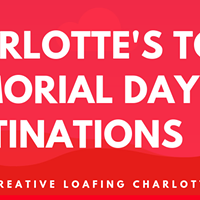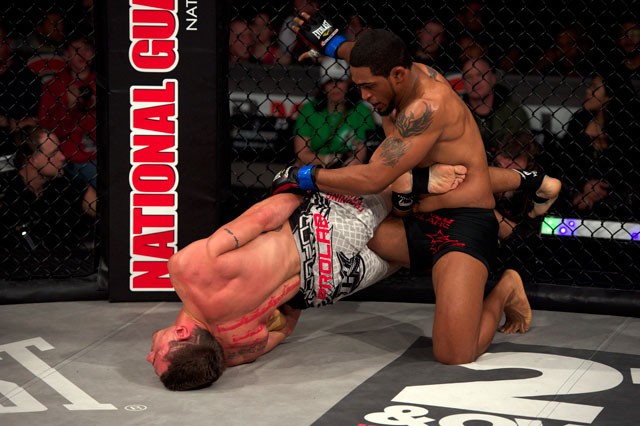Joe Pacheco is uncaged
The Gastonia native is a rising star in one of the bloodiest and fastest-growing sports in the world
By Ana McKenzieThe mid-June sun reigns overhead, broiling the earth below. The heat sits like weights on Joe Pacheco — shrouded in thick sweatpants and a sweatshirt — as his feet thud right, left, right, on the asphalt parking lot. Dehydrated, hungry and out of shape, he's been running in circles for half an hour trying to sweat out the last few pounds so he can qualify for his first amateur MMA tournament, in Winston-Salem. His lungs beg for air but summer won't relent.
Nothing is working in Pacheco's favor, so Michael "Cornbread" Allen, being the good coach and manager that he is, pushes him a little further.
"He got too tired to run, so I made him drop to the floor and do snow angels — you know what I'm talking about?" Allen says, as he flaps his arms up and down, laughing.
The two had arrived here on this June morning in 2011 knowing Pacheco was too heavy to compete. He had spent only the last two months in the gym, but Allen brought him anyway. He knew Pacheco could lose the weight in a few hours — and win at least one fight.
Pacheco shows up weighing 215 pounds and after just a few hours drops to 212, but it isn't enough to put him in his weight class. Discouraged and embarrassed, he misses his first fight.
A few hours and workouts later, Pacheco weighs in at 209 and is eligible to fight his next opponent, a hometown hero with more experience, and the crowd, about 1,000 deep, on his side. Within 30 seconds of the opening bell, Ryan Curtis' right hook knocks Pacheco out.
"His opponent wasn't what I would call a third-tier fighter," says Allen, a former MMA competitor and wrestler himself. "Joe was competing with a high-level athlete."
What happens next explains why Allen, who had seen Pacheco wrestle as a kid in Gastonia, didn't stop the fight after the knockout. It explains why, in December 2012, scouts from professional MMA promoter Bellator selected him out of about 50 local fighters for a two-year contract, a feat nearly impossible for men 10 times more experienced. It explains why Pacheco is a rising star in one of the fastest-growing sports in the world, one former presidential candidate John McCain famously referred to as "human cockfighting."
After a few seconds on the ground, Pacheco wakes up, grabs his opponent's legs, and brings him down. He returns to his corner totally unaware of what had just happened.
"'Bread' was trying to tell me I had been knocked out, but I didn't believe him," Pacheco says. "It didn't stop me."
Two rounds later, the judges unanimously select the out-of-shape, overweight fighter the winner.
"I knew right then we had something special," Allen says.
JOSEPH MARTIN PACHECO grew up in Queens, N.Y., a fan of Marvel comics and his grandmother's hearty Belizean cooking. Being the youngest of his cousins — of which there are so many he can't count — made him a victim of relentless teasing. Once, Pacheco's head had to be cut out of a chain-link fence after he naively followed through on a dare.
"Any holiday, I could never enjoy it, because I'm always in the emergency room with him," says his mom, Marcia Tillett.
The boys eventually turned into men, a difficult transition in a rough neighborhood. Pacheco's mother feared for her son after some cousins started getting into fights at school. In 1995, she visited a friend in Charlotte.
"I decided when I came and saw it was so family-oriented here ... moving here would be the best thing for [my children]," she says. Divorced and pregnant with Pacheco's middle brother — Joe is the oldest of three boys — she decided to use her 1995 tax money to fund a move, first to Charlotte, then South Carolina, and eventually settling in Gastonia.
Pacheco wouldn't come with her, at least not for the first year. Tillett sent him to Georgia to live with his father so that he could learn "how to be a man," she says. Once in Georgia, his dad Julius, who was in the Army, rationed his son's meals. When Julius was temporarily shipped to Germany during Pacheco's stay, the 10-year-old was left in the care of his stepmother, who treated him more like a housekeeper than a son.
"I called him Cinderfella," Tillett says.
Pacheco had suffered his parents' divorce, an abusive stepfather in Tillett's second husband, and the lack of a strong male figure in his life. It all took a toll on him. He started showing signs of emotional strain in the first grade — mostly attention-seeking behavior, like interrupting class. The mouthing off, which Pacheco recognizes now was misguided anger, got so bad his teachers recommended counseling by second grade.
Without friends or much support in Georgia, Pacheco could feel his anger deepening. By the time he arrived in Charlotte, he was so thin his bones were visible.
Without MMA, Pacheco says he doesn't feel quite himself.
Life turned around for a short while in Charlotte. The "Pacheco Luck," as Allen calls it, kicked in in middle school. (According to Allen, that same luck would help Pacheco that day in Winston-Salem after the referee was unable to reach him on the ground in time to end the fight.) He picked up football and instantly found a group of friends and a way to channel his anger.
One day, in seventh grade, a boy sitting in front of him in class turned around and suggested he try out for the wrestling team because of his large size.
A high school state championship later, Pacheco was on the fast track to wrestling in college. But luck would abandon him, if only momentarily. At 18, he became a father.
PACHECO'S YOUNGEST DAUGHTER Leah hands him a small tube of glittery pink goop she's just pulled from a bag of princess-themed goodies. She doesn't know where to apply it and, to her dismay, neither does he. Fortunately, Tillett is close enough to provide a quick answer: her lips, of course.
Pacheco, 28, and his three young children — Javon, 9, Simone, 5, and Leah, 4 — are seated at Tillett's kitchen table in her modest two-story Gastonia home in March. Moments like these are rare for him and his children, who live with their mother, Pacheco's ex-wife. His day job is training for at least eight hours: running, lifting weights and grappling or boxing with his coach or members of his gym, Charlotte's Renegade. His contract with Bellator means he travels for fights, the latest a win in Maine. Pacheco's contract is safe through a loss but will expire in two years, at which point he'll try to get re-signed and work toward a Bellator world championship. Credit luck, training or both: So far, he has a 6-0 record.
He says he hopes his children can understand why he spends so much time away from them, and why he puts his body through the rigors of MMA, a sport so vicious, so bloody, that it's taken nearly 20 years to be legally accepted in all 50 states. (Legislation reversing the ban in New York is pending.)
Without MMA, Pacheco says he doesn't feel quite himself.
His early 20s was a dark period in his life. He had to forgo college for a nine-to-five job to support his then-wife and their children. He worked at Food Lion, a group home for mentally disabled people, and, his last job before picking up MMA, Pepsi. The closest he got to the wrestling mat was watching UFC fights on TV.
Naturally Pacheco jumped at an opportunity to help a friend who was training with Renegade with his grappling skills. In the gym Joe realized MMA was a way to follow up on his high school dreams.
Two months later, he was in Winston-Salem with Allen.
"Going into the cage, I had tears going down my face," he says. "I was so excited."
MIXED MARTIAL ARTS, or MMA, came stateside in 1993 after a sporting family in Brazil famous for creating Brazilian jiu jitsu challenged fighters of other disciplines, including wrestling, boxing and Muay Thai, a striking-based martial art from Thailand, in a televised competition called The Ultimate Fighting Championship. Though Royce Gracie was the less athletic brother of the bunch, he famously beat three challengers in just five minutes.
The fight, and others that followed, created a cult following but sparked a national uproar, capped off by McCain's cockfighting comment. He had a point. Early fights had minimal rules; the first, the televised fight in 1993, barred biting, eye-gouging and groin attacks, but not much else. Time limits in the cage, weight classes and minimal protective clothing have been added over the years, but what MMA hasn't done — yet, anyway — is gain mass appeal. Though fans are notoriously obsessive, it has yet to produce a star a non-fan would recognize. Most people have heard of Kobe Bryant; not as many have heard of Chuck Liddell, MMA's most famous fighter.
"Although UFC events sell out, pay-per-view buys are huge, and sponsor money is growing, it's still somewhat of a fringe sport," says Kenny Letts, CEO of local MMA promoting group Fight Lab.
But it's on the brink of reaching the mainstream. Liddell starred in a recent Bud Light commercial.
"Even in the mid '70s, there were still NFL players that ... had second or third jobs," Letts says.
ON A RECENT chilly night, Pacheco and a few members of Renegade have driven more than three hours south of Charlotte, to Wild Bills in Duluth, Ga., to watch two of their own fight. At the club Pacheco alternates between anxiously pacing and mock grappling with some teammates, trying his best to warm them up.
Bills normally hosts aging hair metal bands and raging hip-hop dance parties, but tonight it's amateur MMA. A line laces out the door and around the building, which is squat and wide and surrounded by a parking lot; it resembles a movie theater more than "America's Largest Dance Club & Concert Hall," per its website.
Blue and red lights soak the interior, and radio-friendly rock blares in the background. Waitresses skip around in chaps and tank tops, selling cheap beer to the few patrons who've made it through the front. The place reeks of chicken wings and stale beer.
An equipment room backstage has transformed for the night into a holding cell for fighters before they make their way to the cage — MMA's boxing ring — in the center of the building. Some are here to prove themselves worthy of the pros. Others are just trying to break in as amateurs. Pacheco came mostly to provide moral support, more than just pep talks and warm-up sessions. Letts is in the middle of a conversation with someone when Pacheco comes from around a corner and softly kicks the back of one of his knees, buckling that leg. Letts turns to see who had pranked him, and finds a smiling Pacheco running away. It makes you wonder if he didn't get his head stuck in that fence for a laugh.
Letts wore a white-collar — "I could sell the shit out of some insurance" — before getting into MMA through a desire to change his workout routine. Now he works with "Cornbread" Allen, who got his nickname after getting so upset with a former teammate for eating his food after a tournament that he flipped a table. Guys who work out eight-plus hours a day take food seriously.
Fighting this chilly night in Georgia are Roger "The Leprechaun" Carroll, a short but spry guy who likes to play up his Irish heritage, and Adam Dehart, a young Ben Affleck look-alike. Carroll's eventual loss overshadows Dehart's victory, mostly because it was a shot at a professional contract.
Pacheco's experience with amateur MMA is mostly supporting his teammates who are trying to get their feet wet in the sport or break into the pros. He was in seven amateur fights — including the first, in Winston-Salem — before Bellator offered him a contract in December.
Football has the National Football League; basketball the National Basketball Association. MMA has Bellator and the UFC, though there isn't much competition between them. The UFC grew from that first televised fight to the largest MMA promoter and pay-per-view event provider in the world, broadcasting fights in 149 countries and a billion households. It's got the name recognition and most of the better-known fighters. Bellator began in 2008 and touts itself as the largest "tournament-based" MMA promoter in the world, meaning it focuses less on individual fights and more on series that lead up to its world championship. Most of its fights air on Spike TV and MTV2. Though relatively smaller, it offers Pacheco a chance to train for a living — under contract he can't disclose how much he makes — and travel for fights. He says he's never aspired to join UFC, mostly because he enjoys Bellator's down-to-earth feel. Every time the CEO goes to one of Pacheco's fights, he stays in the same hotel off the highway.
If MMA doesn't work for Pacheco, Allen likes to tell people he's going to spend a year training the fighter to try out for the Carolina Panthers as a fullback. Pacheco is the first to roll his eyes when he hears that, but with a perfect record in the pros and a little over a year and a half of training, it's not hard to see why Allen insists Pacheco's athleticism is his calling card.
"He had one of the worst introductions to MMA I've ever seen," Allen says. "But the funny thing about Joe is, he's not even half where he could be."
Speaking of...
-

Charlotte’s top Memorial Day destinations, according to Lyft riders
May 24, 2019 -
Getaways in the Queen City
Jul 14, 2016 -

2015 Pride Power Couple
Aug 12, 2015 - More »
Latest in Cover
More by Ana McKenzie
Calendar
-
 Harlem Globetrotters 2024 World Tour presented by Jersey Mike's Subs @ Bojangles' Coliseum
Harlem Globetrotters 2024 World Tour presented by Jersey Mike's Subs @ Bojangles' Coliseum -

Queen Charlotte Fair @ Route 29 Pavilion
-

Open Mic Comedy Nights with Craig Collin @ Carolina Beer Temple.
-

NEW WINDOW GALLERY-Pat Rhea-ACRYLIC PAINTINGS-April 05-30 2024 VALDESE, NC 28690 @ New Window Gallery/Play It Again Records
- Through April 30, 12 p.m.
-

TheDiscountCodes
-
Beauty Industry Trends To Look Out For In Charlotte In 2022
-
Charlotte Pride and Trans and Queer People of Color Collective clash on Pride Week priorities 2
Disagreements over representation, policing in lead-up to Pride
-
Upgrade Labs Announces Expansion Plans in Charlotte Continuing Its Tremendous Growth













